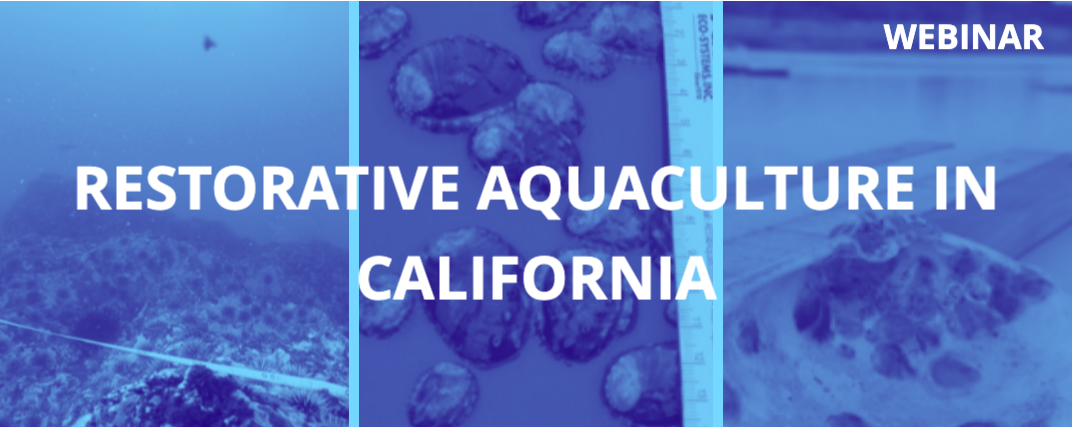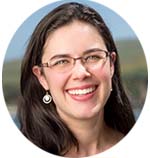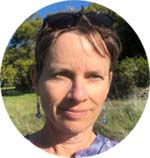
California has been at the forefront of environmental action for decades. However our ocean, bays and estuaries are still in dire need of not only protection but restoration. While aquaculture has been historically linked to contributing to environmental damage, more recently aquaculture is being used with the goal to restore and enhance our marine environment.
California Sea Grant and Save Our Shores are pleased to present a short introduction to three of the restoration and conservation oriented aquaculture activities underway in California. Tune in to this webinar and hear about endangered white abalone’s road to recovery, efforts to rebuild decimated Olympia oyster populations, and sea urchin ranching with a view to restore our kelp forests.
Agenda
5:00 pm: Welcome address & introduction – Luke Gardner CA Sea Grant (Covenor and Moderator) and Kevin Johnson CA Sea Grant (Convenor)
5:05 pm : Presentation 1 – “Making haste at a snail's pace: Saving the endangered white abalone” Kristin Aqualino, UC Davis.
5:20 pm : Presentation 2 – “Using aquaculture to save native oysters from local extinction in a California estuary” Kerstin Wasson, Elkhorn Slough National Estuarine Research Reserve.
5:35 pm : Presentation 3 – “The sushi solution: Using roe enhancement aquaculture to aid in kelp forest restoration” Renee Angwin, SDSU.
5:50 pm : Summary and closing remarks – Katherine O’Dea, Save Our Shores (Convenor). For more information and to sign up for news and announcements please visit www.saveourshores.org
6:00 pm : Webinar ends
Meet the panelists
 Kristin Aquilino, PhD
Kristin Aquilino, PhD
UC Davis, Bodega Marine Laboratory and California Sea Grant
Making haste at a snail's pace: Saving the endangered white abalone
There are few species as iconic to the west coast of North America as abalone, prized for their iridescent shells and tasty meat. Though abalone were once taken for granted as an inexhaustible resource, overharvest decimated populations to the point where some species, including the white abalone, are critically endangered. Thanks to scientists, policy makers, aquariums, and aquaculture farms working together to breed these animals in captivity and place them into the wild, there is now a great deal of hope for the persistence of these charismatic marine snails. Learn more: Saving the endangered white abalone
 Kerstin Wasson, PhD
Kerstin Wasson, PhD
Elkhorn Slough National Estuarine Research Reserve
Using aquaculture to save native oysters from local extinction in a California estuary
Olympia oysters are our only native oyster in California but are now very rare in Elkhorn Slough and throughout the state. Recently though in a state first, oyster babies were spawned and raised at Moss Landing Marine Labs aquaculture facility and out-planted in Elkhorn Slough to support native oyster restoration. Learn more: Native Oyster Research at Elkhorn Slough
 Renee Angwin, MS
Renee Angwin, MS
Coastal and Marine Institute, San Diego State University
The sushi solution: Using roe enhancement aquaculture to aid in kelp forest restoration
Plagues of purple sea urchins along the coast of California have led to “urchin barrens” where urchins have consumed all the kelp leaving a degraded denuded rocky habitat. One approach to address this issue is to harvest the urchins and feed them in aquaculture tanks on land until their roe can be harvested for sushi. This could provide both high-value seafood while at the same time restore the many ecological benefits of healthy kelp forests. Learn more: Can ranching ‘zombie urchins’ boost uni, save kelp forests?
Conveners
 Kevin Johnson, PhD is a California Sea Grant aquaculture extension specialist based at Cal Poly San Luis Obispo. His research focuses on understanding the genetic potential for adaptation to environmental stress in aquaculturally and ecologically important marine invertebrates.
Kevin Johnson, PhD is a California Sea Grant aquaculture extension specialist based at Cal Poly San Luis Obispo. His research focuses on understanding the genetic potential for adaptation to environmental stress in aquaculturally and ecologically important marine invertebrates.
 Katherine O'Dea is Executive Director of the coastal conservation non-profit Save Our Shores, which believes aquaculture can be an important habitat restoration and conservation tool that could benefit the waters and estuaries of the central California coast. www.saveourshores.org
Katherine O'Dea is Executive Director of the coastal conservation non-profit Save Our Shores, which believes aquaculture can be an important habitat restoration and conservation tool that could benefit the waters and estuaries of the central California coast. www.saveourshores.org
 Luke Gardner, PhD is a California Sea Grant aquaculture extension specialist based at the Moss Landing Marine Laboratories. Gardner is a biologist whose work focuses on leading and supporting research, extension activities, and education in the field of aquaculture.
Luke Gardner, PhD is a California Sea Grant aquaculture extension specialist based at the Moss Landing Marine Laboratories. Gardner is a biologist whose work focuses on leading and supporting research, extension activities, and education in the field of aquaculture.





